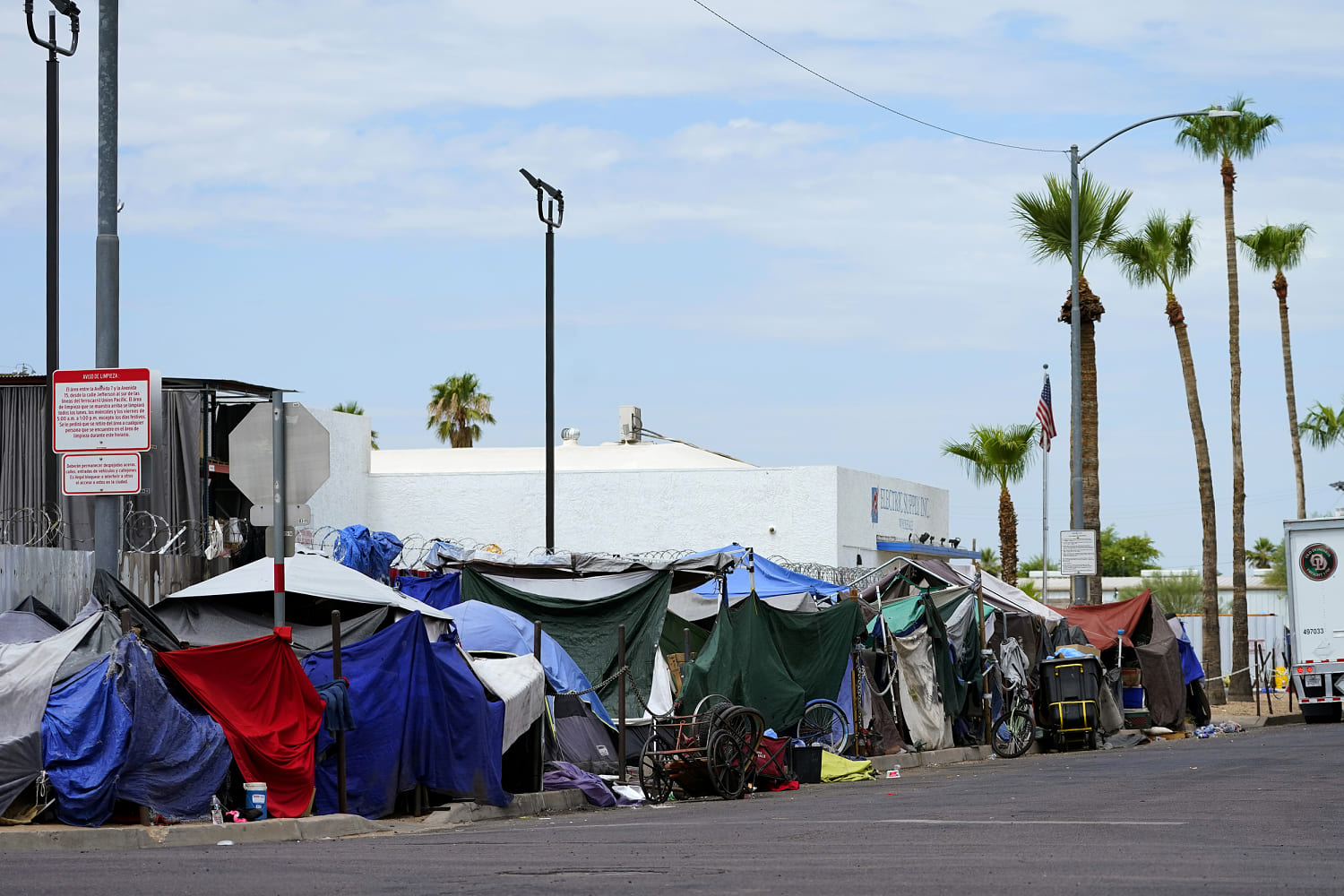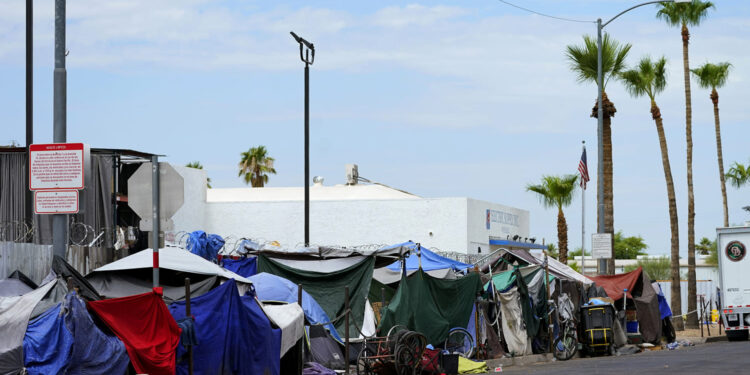
Faith Kearns sank to the ground and burst into tears in her studio apartment on Thursday after the Justice Department asserted something she had known for years: Phoenix police routinely violate the rights of homeless people.
“When the DOJ said that, it was like, ‘Wow, this is validation,’” said Kearns, who didn’t have permanent housing for more than a decade before moving into transitional housing in 2021. “And it’s validation for a lot of the homeless that were with me on the street.”
The conclusion followed a 34-month investigation into abuse allegations against the Police Department, between 2016 and 2022. The 126-page report also includes instances from 2023 and 2024.
Among other things, the Justice Department found that Phoenix police frequently stop, detain and arrest homeless people without reasonable suspicion that they’ve committed any crime and also that officers unlawfully seize their property. The report marks the first time a civil rights investigation into police practices found that the civil and constitutional rights of homeless people were violated.
Kearns, 64, said interactions she had with police left her feeling like “scum” and “dirt.” She recalled an instance when an officer mocked her and a friend for lying in sleeping bags on the street.
“‘Gee, that sleeping bag looks nice,’” she said the officer told her. “‘Can I crawl in?’”
She said the officer refused to give her his name and his badge number.
Kearns is among nine people who have sued the city in federal court over its treatment of the unhoused and raids of homeless camps. In interviews with NBC News, she and other formerly homeless people and advocates for the unhoused said they celebrated the Justice Department report and expressed doubt that change could come without a consent decree as enforcement — a prospect city officials oppose.
Mayor Kate Gallego declined requests for an interview. She told Phoenix’s CBS affiliate that the report was “difficult to read” and that the city is taking it seriously, though she said the fault does not lie with individual officers.
“We know our officers care deeply about this community,” Gallego said on Tuesday. “You don’t go into policing because you want to become incredibly wealthy or famous. You do it because you care about the community in which you live. The report pointed to deficiencies in training and data; those are things that really fall to the responsibility of elected officials to step up and make sure we do a better job. And we will deliver for not just our officers, but our entire city.”
The Fund for Empowerment, which is also a plaintiff in the lawsuit, advocates for and seeks to protect the rights of Arizonans experiencing homelessness or housing insecurity.
“I think the city has always known we were telling the truth,” said Elizabeth Venable, co-founder of the Fund for Empowerment. “These are just not truths that some of them care about.”
A spokesperson for the city said it could not respond to any comments made by those involved in litigation with the city.
The suit, filed by the American Civil Liberties Union of Arizona in November 2022 and amended in April, alleges that the city’s practices violate individuals’ rights to be free from unreasonable seizures of their property, rights to be free from cruel and unusual punishment and deprive individuals of their property without due process.
The Justice Department found that, in addition to frequently stopping, detaining and arresting homeless people without cause, Phoenix police also seize and destroy their property without providing reasonable notice or fair opportunity for them to collect their belongings.
Citing the report, assistant Attorney General Kristen Clarke, who oversees the Justice Department’s Civil Rights Division, said in a news conference last week that 37% of the police department’s misdemeanor arrests and citations are of homeless people.
“The harm caused by unconstitutional policing is not spread evenly across the City’s population,” the report reads, adding that Phoenix police target people experiencing homelessness and disproportionately use force against people with behavioral health disabilities. The Justice Department said the report “does not address the root causes of the continued homelessness problem faced by the City” and Phoenix police, “but instead focuses specifically on law enforcement encounters and interactions with those experiencing homelessness.”
Frank Urban, 53, who, like Kearns, spent years living on the streets and is a plaintiff in the suit, said he, too, was overjoyed by the Justice Department’s scathing report.
“It made me emotional,” said Urban, a friend of Kearns who lives in the same transitional housing where she lives. “It made me think, ‘Yes, finally, about time.’”
Kearns and Urban were once roommates and said they were most recently homeless after they were evicted from an apartment in the Sunnyslope neighborhood because they had too many cats. Both said they had experienced raids performed by the city and its police officers which have resulted in the destruction of their personal property on multiple occasions over the last few years, which is among the allegations in the lawsuit.
On one occasion, they said in separate interviews, they and other homeless people were sleeping by a canal when police descended on them with bullhorns around 2:30 a.m. and gave them 10 to 15 minutes to gather their belongings and move to a designated area.
“It doesn’t matter whether you’re in a wheelchair or on crutches or not mentally there,” Urban said. “If you don’t do it within that time, they throw away everything that you have. I’m talking ID, social security cards, blankets, bedding, medications, you name it.”
“Basically, anything that would make your life more comfortable while you’re homeless,” he added.
Both said that they had lost treasured items, including family photographs, as well medications that can be difficult to replace. Kearns said she has had to file a police report to refill prescriptions destroyed in the raids, and Urban said he had lied and told his doctor that his medications had been stolen by another homeless person to secure refills because he didn’t think they would believe the items had been seized by police.
“A lot of people have a stereotype that we’re all criminals and we’re not,” he said. “We’re decent. For the most part, we’re just as decent as people that are housed.”
Venable said that, in her role at the Fund for Empowerment, since August 2018, she has personally screened at least 1,000 homeless people, almost all of whom said they had had their property thrown away.
Kearns, Urban and Venable each said they had spoken with the Justice Department for its investigation.
Urban said his experiences with the police have made him resent them.
Urban, Kearns and Venable, along with Jared Keenan, the legal director of the American Civil Liberties Union of Arizona, agreed with Clarke, the assistant Attorney General, who last week said that the severity of the Justice Department’s findings indicated “this is one instance where we can’t count on the police to police themselves.”
“As a first step, we’re going to need some sort of federal oversight or consent decree or something to start moving this conversation in the right direction, so that the people of Phoenix can have a police force that doesn’t routinely violate their rights,” Keenan said.
He said the ACLU of Arizona had recently amended its complaint, alleging that since a federal injunction went in place blocking the Phoenix police and the city of Phoenix from enforcing certain laws against unhoused people, the Phoenix police has continued to criminalize homelessness and cite people under statutes that have been enjoined.
“The DOJ report confirms those allegations in our view,” he said.
Gallego said in the interview Tuesday that the city is making “major changes,” including having more social workers responding to calls that involve homelessness and behavioral issues — a change she said was implemented in her first month in office.
She said she had also set up the Office of Homeless Solutions, staffed by 36 people, many of whom she said have experienced homelessness themselves.
“Our goal is to have those individuals leading when we interact with people experiencing homelessness and have law enforcement focus more on traditional crime,” she said.
A spokesperson for the city said much has changed since the Justice Department launched its investigation in 2016.
Since December 2021, the spokesperson said, the city has had a property storage program for people who accept services that allows them to store their belongings at the shelter where they are staying or another site. Additionally, the city also opened a Safe Outdoor Space in November — equipped with restrooms, showers, meal service, property storage, round-the-clock security and a code of conduct — designed for people who do not want to be in an indoor shelter, among other changes, the spokesperson said. The city says the number of unsheltered people has fallen 19% in the past year.
Still, Kearns said she believed the report indicated a consent decree, an improvement plan the city would have to agree to, seemed the only remedy.
“I feel that that’s necessary because obviously the Phoenix police cannot control themselves,” she said. “This has been going on for a very, very, very long time. And as a citizen in Phoenix, Arizona, I’m quite tired of it. I’ve seen too many people hurt. I’ve been hurt. How much clearer can we make it?”







